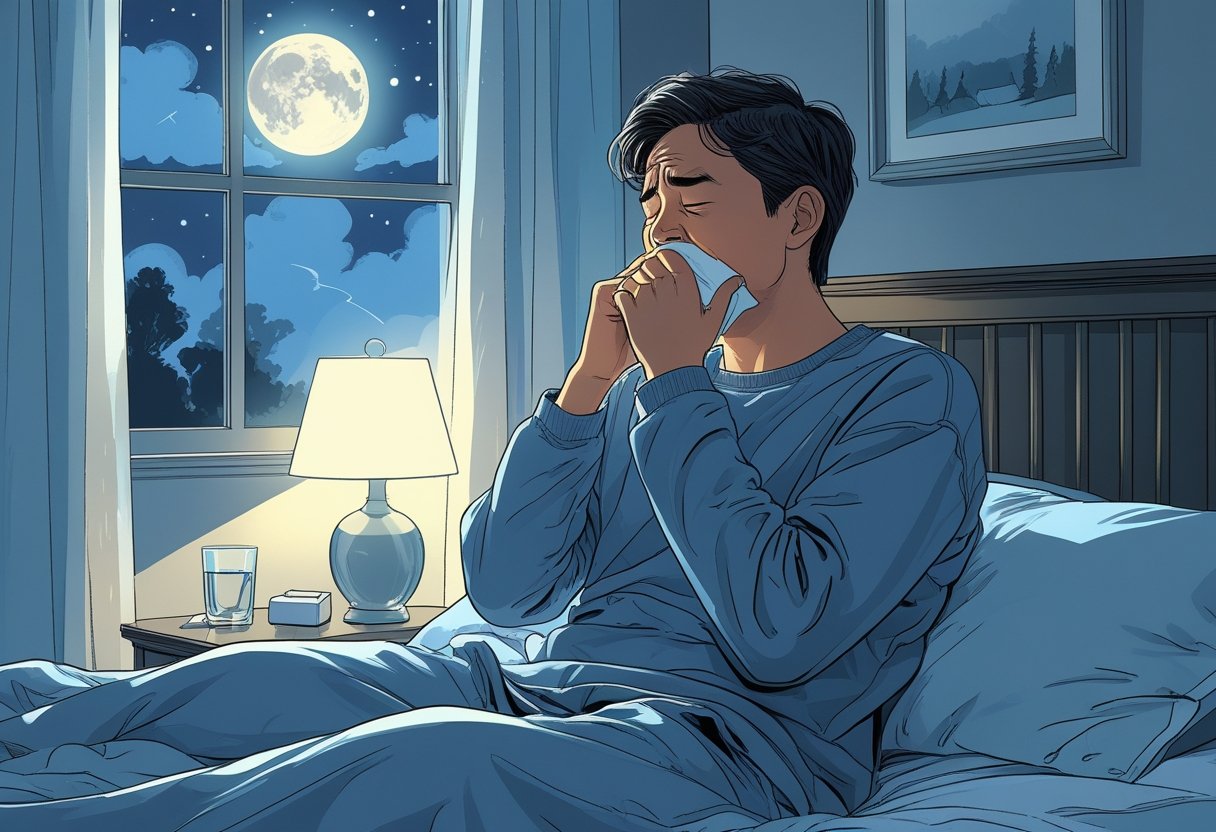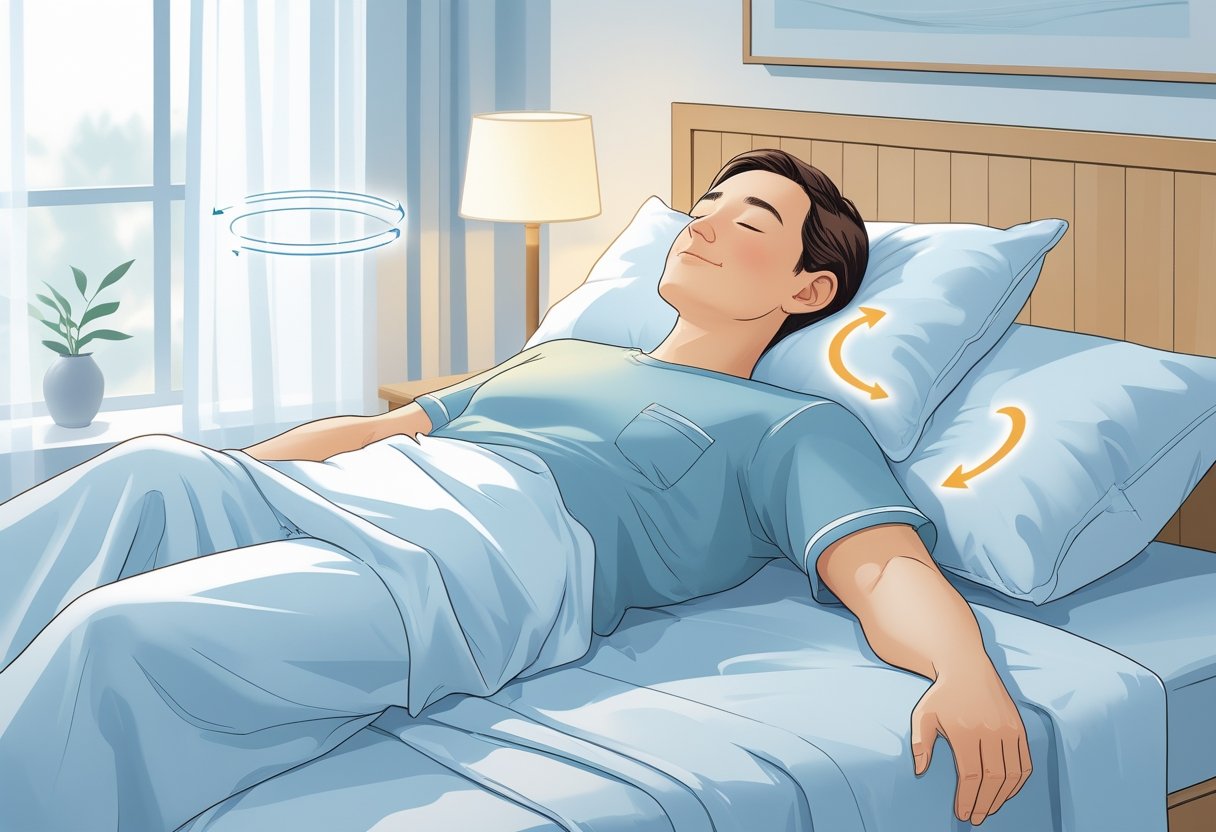Sleeping with a cough can be tough. The irritation makes it hard to relax, and coughing fits can keep you awake. But a few simple changes can make it easier to rest.
Keeping your head raised is one of the easiest ways to help. When you sleep propped up, mucus drains more easily and is less likely to trigger a cough. Sipping warm tea or taking a spoonful of honey before bed can also soothe your throat. It also helps to keep your bedroom air moist. A humidifier can prevent your throat from drying out during the night. Stay away from smoke, strong scents, or anything else that can irritate your airways.
Before bed, try to keep things calm. Avoid rushing around or stressing yourself out. A quiet routine can relax your body and help you settle into sleep, even with a cough.
Key Takeaways
- Elevating the head and staying hydrated reduces coughing at night.
- A moist environment and proper sleep position ease throat irritation.
- Simple changes in bedtime habits improve sleep quality despite a cough.
- The right mattress supports proper spinal alignment and reduces pressure points, which eases breathing and minimizes coughing for a more restful night’s sleep.

Why Sleep Position Matters With CPAP

Coughing at night often feels worse and can interrupt sleep. Several factors explain why coughs intensify and why rest becomes more difficult during illness. Some of these even determine whether coughing happens during sleep or only when you’re awake.
Why Is My Cough Worse at Night
Coughs worsen at night due to changes in body position and increased airway sensitivity. Lying down allows mucus to pool or drip into the throat, which can trigger more frequent coughing. Gravity no longer helps mucus drain, so irritation builds up.
Dry indoor air and allergens like dust in pillows or blankets may also aggravate the throat. Acid reflux, which flares up more easily when lying flat, can further inflame the throat and airways, worsening the cough. Using a cool-mist humidifier or sleeping with the head slightly raised helps ease irritation and limit mucus buildup. These adjustments often explain why coughs seem worse at night and help improve the ability to fall asleep.
Why Can’t I Sleep When I’m Sick
The body reacts to illness by releasing chemicals that increase sensitivity and discomfort, including frequent coughing. Coughs interrupt the sleep cycle, making it harder for the immune system to recover fully.
Inflamed or congested airways tighten and limit airflow, which makes breathing noisier and more uncomfortable. These symptoms make sleep feel out of reach. Mucus drip, heartburn, and irritated airways are all common culprits behind nighttime restlessness.
A warm drink before bed and sleeping with a slight incline can help ease symptoms. Clearing the airway and calming cough reflexes improve sleep quality when sick.
Can You Cough in Your Sleep
Coughing during sleep happens, though it’s less common than coughing while awake. During deep sleep, the body lowers its cough reflex to avoid disrupting rest. Still, when irritation or mucus builds up too much, the body forces a cough, even in sleep. Frequent coughing overnight might signal more serious conditions like respiratory infections, asthma, sleep apnea, or acid reflux. Each of these can disturb the airway and lead to sleep disruptions.
Controlling triggers such as dry air, allergies, or reflux helps reduce nighttime coughing. Elevating the head or using humidifiers can keep airways clearer and reduce nighttime coughing episodes.
Best Sleeping Positions for Cough Relief
Sleeping in the right position can reduce coughing and help people rest better. Adjusting body placement can ease throat irritation and improve breathing.
Best Position to Sleep With a Cold and Cough
For most people with a cold and cough, sleeping on the side is great. This position helps clear mucus and prevents it from collecting in the throat. Side sleeping lowers the risk of choking or sudden coughing fits caused by mucus buildup.
Stomach sleeping may help in some cases because it allows mucus to drain, though it doesn’t suit everyone. It can put unnecessary strain on the neck and back. Avoid lying flat on the back, as this usually worsens coughing by letting mucus drip down the throat.
Elevating the Head and Upper Body
Raising the head and upper body at a 4 to 6 inch angle often reduces nighttime coughing. This position takes pressure off the airways and limits mucus accumulation. Use extra pillows or an adjustable bed frame to achieve the incline.
This approach works especially well for dry coughs, since it reduces irritation. It also helps those dealing with sleep apnea or acid reflux, both of which can trigger coughing. Keeping the head elevated creates less irritation and improves airflow, making it easier to breathe during sleep.

Optimizing Your Sleep Environment
Creating the right sleep environment reduces coughing and supports more restful sleep. Focusing on air quality and making small room adjustments lessens nighttime coughing and makes it easier to manage.
Humidity and Air Quality
Dry air worsens coughs by irritating the throat and airways. A humidifier adds moisture to the air, which soothes dryness and limits coughing fits. Ideal humidity stays between 40% and 60%.
Air quality matters just as much. Keep smoke, strong fragrances, and allergens out of the bedroom to avoid common cough triggers. Dusting and vacuuming regularly helps remove airborne irritants. Cracking a window to let in fresh air improves ventilation, though cold air may sometimes worsen symptoms, so keeping the temperature balanced is important.
Bedroom Adjustments for a Better Night
Raising the head with extra pillows or a wedge pillow helps prevent mucus buildup in the throat, which can cause coughing. Sleeping on the left side also reduces the risk of acid reflux, another possible trigger. Choose breathable bedding that stays cool to avoid overheating, as sweating can worsen discomfort. Keep the room temperature between 65-70°F (18-21°C) to make breathing easier.
Avoid heavy meals or dairy close to bedtime, as these can increase cough symptoms. A calm bedtime routine with soft lighting and low noise helps the body relax and rest, even when a cough continues.

Managing Dry Cough at Night

A dry cough at night may result from several factors, including irritants and underlying health conditions. Addressing these issues and soothing the throat often helps reduce coughing and improves sleep quality.
Identifying Causes of Dry Cough
A dry cough usually does not produce mucus. Common triggers are allergies, viral infections, or exposure to irritants like dust and smoke. Postnasal drip, which occurs when mucus runs down the throat, can also cause coughing at night.
Conditions such as asthma or acid reflux can worsen coughing when lying down. Cold and dry air may irritate the throat more and make symptoms worse. It’s important for both children and adults to watch for signs of infection or ongoing allergen exposure. Identifying the root cause is key to managing symptoms. Remove known irritants and keep the sleeping environment free of dust. Consult a doctor if the cough worsens or lasts longer than a week.
Tips for Relieving Dry Throat
Dry air often irritates the throat and sets off coughing. A humidifier adds moisture to the air and helps ease throat dryness. Inhaling steam from a hot shower or using essential oils like eucalyptus may help clear the airways. Warm liquids can loosen the throat and offer relief. Avoid caffeine and alcohol before bedtime since both may dry out the throat further. Elevating the head while sleeping limits mucus buildup and throat irritation.
Keeping the air moist and the throat hydrated may ease the coughing reflex. This helps especially if dry air or postnasal drip tends to cause symptoms.
Bedtime Routines to Alleviate Cough
A consistent bedtime routine helps reduce coughing and promotes more restful sleep. Sipping warm liquids and using calming remedies soothe throat irritation and loosen mucus.
Pre-Sleep Hydration Strategies
Drinking warm liquids before bed is great to ease a cough. Warm tea, broth, or even plain warm water soothes the throat and thins mucus, which helps clear the airways more easily.
Staying hydrated also keeps the throat moist, which can lower the urge to cough. Cold drinks may irritate the throat, so it’s better to avoid them. Instead of chugging water all at once, sip small amounts throughout the evening to avoid waking up for bathroom trips.
Running a humidifier in the bedroom adds moisture to the air, which reduces throat irritation overnight. A cool-mist humidifier helps, as it keeps the air comfortable without adding heat.
Using Soothing Remedies Before Bed
Taking a spoonful of honey right before bed helps calm the throat and prevent coughing fits. Honey coats the throat, easing irritation and allowing you to fall asleep more easily. For dry coughs, try sucking on throat lozenges or cough drops to stimulate saliva and relieve the airway. If nasal congestion is a problem, a nasal saline spray clears the passages and supports easier breathing.
Raising your head with extra pillows prevents mucus from collecting in the throat, which often leads to coughing. Keeping the upper body elevated reduces irritation and supports better airflow while you sleep.

When to Seek Medical Advice
Knowing the warning signs of a serious cough and how to communicate symptoms to a doctor helps prevent complications. Timely medical advice proves crucial when symptoms worsen or fail to improve.
Recognizing Red Flags
A cough lasting more than three weeks requires evaluation by a doctor.
Other red flags include:
- Coughing up blood
- Shortness of breath or wheezing
- High fever above 101.3°F (38.5°C)
- Chest pain or persistent tightness
- Sudden weight loss or night sweats
People with underlying health issues such as asthma, COPD, or a weakened immune system should seek care sooner.
Talking to Your Doctor
Patients must clearly describe the cough’s duration, severity, and triggers. They should mention any accompanying symptoms such as fever, fatigue, or changes in mucus color. It also helps to report recent exposures to illnesses or environmental irritants.
The doctor may inquire about medications taken and past lung or heart conditions. This information guides decisions about tests, including chest X-rays or sputum analysis, and determines appropriate treatment steps.
How the Right Mattress Help Soothe Nighttime Coughing
Choosing the right mattresses essential in soothing nighttime coughing. A mattress that provides proper support keeps the spine aligned, which reduces pressure on the body and promotes easier breathing during sleep.
Mattress firmness and material influence comfort and how well the body receives support. A mattress that feels too soft may cause the body to sink, which can lead to poor alignment and increased discomfort that worsens coughing. Conversely, a mattress with good support helps maintain a neutral spine position, eases pressure points, and encourages restful sleep.
Keeping the mattress clean and free from allergens such as dust mites reduces coughing and irritation. Using hypoallergenic mattress covers along with regular washing of bedding limits exposure to these common triggers.
Leesa Legend Chill Hybrid Mattress combines cooling features with advanced support and offers a dual-hybrid spring system and a phase-change fiber-infused quilted top, which regulates temperature and provides targeted pressure relief that may enhance sleep quality for people experiencing nighttime coughing.
The Leesa Legend Chill Hybrid Mattress also focuses on motion isolation for light sleepers or those sharing a bed. Its balanced firmness adapts well to different sleep positions, which is why it’s a versatile choice for those who need both comfort and support during restless nights.

Frequently Asked Questions
Sleeping with a cough can prove challenging, but certain steps reduce coughing and improve sleep quality. Adjusting sleep position, applying natural remedies, and managing mucus remain key factors to consider.







